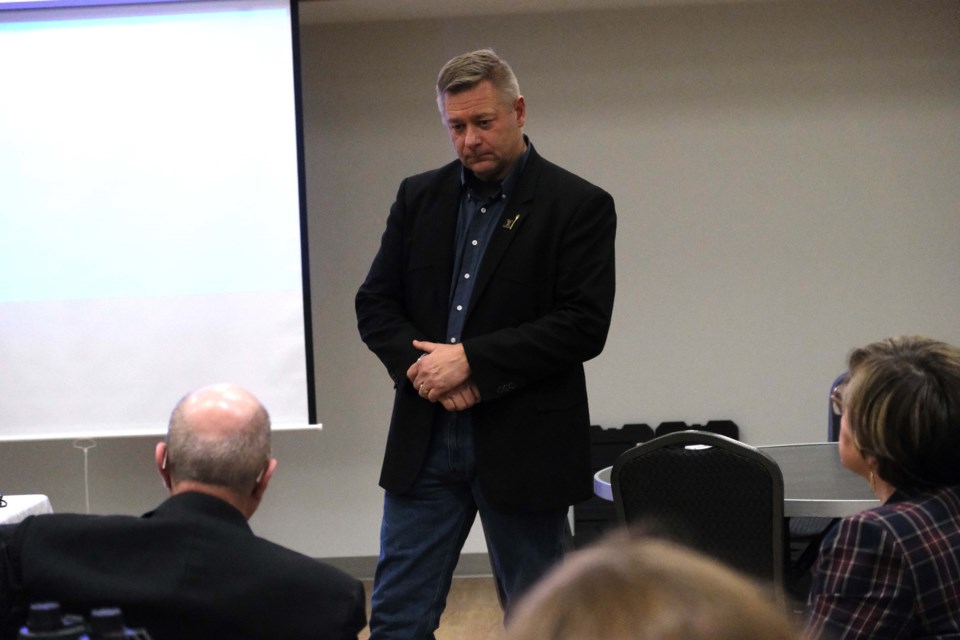Lac Ste. Anne-Parkland MLA Shane Getson faced tough questions from a crowd gathered at Red Willow Place for a UCP town hall meeting last Thursday.
Top of mind for many attendees was a proposed Alberta pension plan.
Getson said that he wasn’t there to “sell” the Alberta plan, but he attempted to dispel attendees’ fears about it.
“Some folks will say that the Canada Pension Plan is the best thing ever,” he said. “I don't disagree — they've got some really good numbers; it’s worked for us for a long time; you’ve got good participation across the country.”
However, 53 per cent of Canada’s pension assets seemed too good a deal to pass up without first checking in with Albertans, Getson said.
However, whether Alberta would actually be entitled to such a large chunk of the country’s pension funds is a subject of much debate, with experts questioning the province’s math.
When pressed about the numbers, Getson described Alberta’s contributions to the CPP as being like a “big fire hose.” Because of the province’s relative youth and relatively high incomes, the province adds a lot to the CPP but receive “a little dribble coming out the bottom,” he said.
One participant challenged Getson on whether the province would abide by the results of a pension referendum.
“There is no flippin’ way that we would do this, unless there was a referendum and Albertans chose to do it. So that's a law that's been passed,” Getson said, referring to Bill 2, which requires the provincial pension plan produce as much or more value for Albertans as the CPP. It also mandates that Albertans pay the same or less into the pension fund, and requires a referendum to take place before the province starts its own pension. However, Bill 2 does not require that the results of a referendum be binding.
The NDP attempted to amend the bill to make referendum results binding, but the UCP majority rejected the amendment. Getson suggested the amendment would be redundant because Alberta’s Referendum Act would prohibit the province from going against the wishes of Albertans, but the Referendum Act does not make all referendums in the province binding.
Challenged again, Getson said, “Why would I not respect it? I’m not going to get political here today.”
Getson said a referendum would take place only if Albertans seemed “bullish” for a separate pension plan and that the UCP is going to continue polling on the issue.
The easiest way to manage the pension would be to continue to use the same group that currently manages the CPP (the CPP Investment Board), Getson said.
One participant questioned the UCP’s spending on advertising for the Alberta plan. “As far as spending $7 million to educate people: Yep, guilty as charged,” Getson said.
Another participant asked about the long-term sustainability of the plan. Getson pointed to Alberta’s booming population and suggested demographic projections “are doing really well.”
Population projections from the province suggest that over the next 25 years “projected growth will be lower than the 1.9 per cent experienced over the previous 25-year period (1997 to 2022), due to population aging and slower gains in immigration.” The average age is expected to be 41.6 by 2051 (up from 39), and Alberta’s population is projected to be 7.1 million people in 2051.
Asked whether the province’s interest in a separate plan stems from its strained relationship with the federal government, Getson suggested the Alberta plan could be used as leverage in other negotiations between Ottawa and the province.
He blamed Alberta’s high energy prices on the shutdown of coal power plants in favour of natural gas, as well as the carbon tax. An April 2022 report from the University of Calgary’s School of Public Policy found natural gas prices, conversion of coal to natural gas, higher demand and carbon pricing accounted for about 38 per cent of Alberta’s high power costs.
The rest, the researchers found, could be attributed to Alberta’s deregulated energy market ceding more control to a smaller group of energy providers who have been empowered to collect greater amounts of money from Albertans since the end of the province’s 20-year power-purchase arrangements.
Getson, along with Calgary-Lougheed MLA Eric Bouchard, conducted a similar town hall called the “What Matters to You? A Better Deal by Billions Town Hall,” in Calgary on Tuesday.




